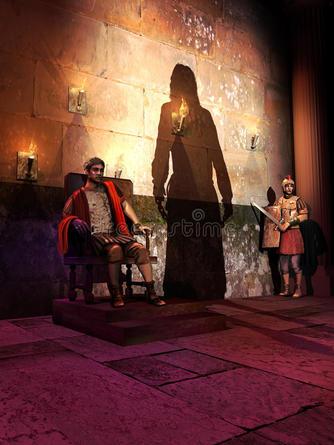
If Christ is King, do I get a vote on that? In short, no. Ideas about the cosmic regency of the Son of Man appear in Daniel, and the other-worldliness of Jesus and his Kingdom get debated in the confrontation with Pilate in John's gospel.
Having just concluded election season - always an extended and exciting time of year in Florida - we once again affirmed the value of voting in elections, and ensuring that every possible legitimate vote gets counted. But when it comes to kings and their kingdoms, there is no voting.
In Daniel's vision of "the Ancient of Days" (God) and then of "one like a son of man," we have an account that actually comes from the 2nd century BC, not 6th century BC Babylon in which it is set. Written only 150 (or so) years before Jesus' birth, it expresses the hope of God's people that God will intervene in human affairs to bring about the promised kingdom of justice and righteousness. Daniel reflects the apocalyptic tradition that the end is coming for the sinful ways of this world. The end time will be heralded by the arrival of a forerunner and then the deliverer. In Daniel's vision this is the "son of man," a title that Jesus uses to describe his cosmic role.
As Jesus is brought by Jewish leaders (simply and inaccurately "the Jews" in John's gospel) before Roman procurator Pontius Pilate, it is in order for the order to be given for Jesus' execution. Only Romans could administer executions.
Pilate never quite understands who Jesus is, what his kingdom is all about, or even why the Jewish leaders are so upset and concerned about him that they seek the death penalty. Join in examining the back-and-forth between Pilate and Jesus. Do you understand Jesus and his Kingdom any better? Watch the sermon video below and see what you think.
Having just concluded election season - always an extended and exciting time of year in Florida - we once again affirmed the value of voting in elections, and ensuring that every possible legitimate vote gets counted. But when it comes to kings and their kingdoms, there is no voting.
In Daniel's vision of "the Ancient of Days" (God) and then of "one like a son of man," we have an account that actually comes from the 2nd century BC, not 6th century BC Babylon in which it is set. Written only 150 (or so) years before Jesus' birth, it expresses the hope of God's people that God will intervene in human affairs to bring about the promised kingdom of justice and righteousness. Daniel reflects the apocalyptic tradition that the end is coming for the sinful ways of this world. The end time will be heralded by the arrival of a forerunner and then the deliverer. In Daniel's vision this is the "son of man," a title that Jesus uses to describe his cosmic role.
As Jesus is brought by Jewish leaders (simply and inaccurately "the Jews" in John's gospel) before Roman procurator Pontius Pilate, it is in order for the order to be given for Jesus' execution. Only Romans could administer executions.
Pilate never quite understands who Jesus is, what his kingdom is all about, or even why the Jewish leaders are so upset and concerned about him that they seek the death penalty. Join in examining the back-and-forth between Pilate and Jesus. Do you understand Jesus and his Kingdom any better? Watch the sermon video below and see what you think.
| 11-25-18-sermon.mp3 |
| 11-25-18-ff-answers.pub.pdf |
| 11-25-18-no_your_vote_doesn’t_count.pdf |
